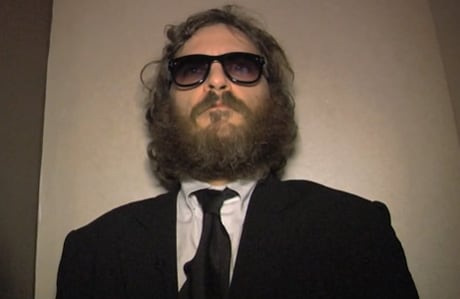One lesson to take away from I'm Still Here is that the entertainment media are frustrated and angered by what they can't easily categorize. If it doesn't perfectly fit the "faux-doc" formula, it must be fatally flawed. What else could explain the critical ambivalence that has greeted one of the most provocative, incisive and crowd-pleasing movies of the year? I saw it at a public screening where the laughter was raucous and constant. It may have helped that by this point, Casey Affleck had confessed it wasn't a real documentary.
But that revelation should never have been necessary. How about the end credits: "Written by Casey Affleck and Joaquin Phoenix"? How about the fact that a man with the last name Affleck plays Phoenix's father? Or that 90 percent of it is insanely over-the-top? Where's the confusion? Yet leading critics like Roger Ebert and Owen Gleiberman couldn't accept this as a staged production before Affleck came clean. Both have since published mea culpas; Ebert now believes Phoenix deserves an Oscar.
You already know the plot: Joaquin Phoenix quits acting, appears on Letterman, raps badly in clubs, snorts coke, cavorts with escorts, meets with P. Diddy, all with laughable results. There's a beautifully lensed "boys-club" feel to the whole venture; an assistant waves his dick around; they yuck it up between JP's tantrums; you feel like you are friends with Casey Affleck and a hyper-petulant JP, and that's great fun.
As Vegas club scum snap pictures and gawk at the train wreck of the final concert scene, the question is raised, "Who is this joke really on?" This is something The Village Voice, in particular, didn't like: the idea that the joke is turned on the consumer. The joke is supposed to be on Britney Spears. It's supposed to be on David Hasselhoff eating a sandwich off the ground. The consumer is supposed to remain holy. Vincent Gallo is heretical for refusing to play the publicity game. Affleck and Phoenix, who have ambitiously desecrated a corrupt culture, are unforgivable.
Could it be that mainstream media entities are actually a little protective of gossip brokers like TMZ (owned by Time-Warner) and their callous, build-them-up-tear-them-down-ethos? These sleazy, younger siblings are the cash cows of many major media conglomerates and Phoenix and Affleck effectively bury them with righteous fervour.
The mischievous gleam in Affleck's eyes as JP first announces his retirement to an ET "reporter" is worth the price of admission by itself.
When the nasty reviews have faded from memory, this is going to be a Criterion Collection-type of film. And despite the industry outrage that pilloried a movie star who failed to promote a product, nobody is going to remember Two Lovers, the film JP didn't bother to pimp on Letterman during his staged meltdown.
(Magnolia)But that revelation should never have been necessary. How about the end credits: "Written by Casey Affleck and Joaquin Phoenix"? How about the fact that a man with the last name Affleck plays Phoenix's father? Or that 90 percent of it is insanely over-the-top? Where's the confusion? Yet leading critics like Roger Ebert and Owen Gleiberman couldn't accept this as a staged production before Affleck came clean. Both have since published mea culpas; Ebert now believes Phoenix deserves an Oscar.
You already know the plot: Joaquin Phoenix quits acting, appears on Letterman, raps badly in clubs, snorts coke, cavorts with escorts, meets with P. Diddy, all with laughable results. There's a beautifully lensed "boys-club" feel to the whole venture; an assistant waves his dick around; they yuck it up between JP's tantrums; you feel like you are friends with Casey Affleck and a hyper-petulant JP, and that's great fun.
As Vegas club scum snap pictures and gawk at the train wreck of the final concert scene, the question is raised, "Who is this joke really on?" This is something The Village Voice, in particular, didn't like: the idea that the joke is turned on the consumer. The joke is supposed to be on Britney Spears. It's supposed to be on David Hasselhoff eating a sandwich off the ground. The consumer is supposed to remain holy. Vincent Gallo is heretical for refusing to play the publicity game. Affleck and Phoenix, who have ambitiously desecrated a corrupt culture, are unforgivable.
Could it be that mainstream media entities are actually a little protective of gossip brokers like TMZ (owned by Time-Warner) and their callous, build-them-up-tear-them-down-ethos? These sleazy, younger siblings are the cash cows of many major media conglomerates and Phoenix and Affleck effectively bury them with righteous fervour.
The mischievous gleam in Affleck's eyes as JP first announces his retirement to an ET "reporter" is worth the price of admission by itself.
When the nasty reviews have faded from memory, this is going to be a Criterion Collection-type of film. And despite the industry outrage that pilloried a movie star who failed to promote a product, nobody is going to remember Two Lovers, the film JP didn't bother to pimp on Letterman during his staged meltdown.
